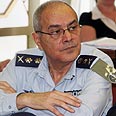
Halutz: 'Mr. PM, we won the war'
According to Sunday Times, so said IDF Chief of General Staff after first night of war in phone call to Ehud Olmert after F-15 destroyed Zelzal missiles
A Sunday morning article in the British weekly the Sunday Times states that IDF Chief of General Staff Lt. Gen. Dan Halutz phoned Prime Minister Ehud Olmert on the first night of the war to inform him that the war had been won.
The article reports that, on this day, July 12th, Halutz was stationed in the general staff operations room in Tel Aviv, overseeing Israel Air Force strikes on Hizbullah strongholds in south Beirut. Over the Mediterranean, an F-15I squadron was preparing to strike at the Iranian made Zelzal rockets pointed at Tel Aviv.
At around midnight, the squadron received instructions to fire and, within minutes, had demolished the first rocket launcher. The squadron leader made contact 39 minutes later, reporting that "54 rocket launchers have been destroyed. We're returning to the base."
According to the article, Halutz smiled and called the prime minister, who was smoking a cigar as he waited in his Jerusalem home to receive the general's phone call. "All long-range rockets have been destroyed," Halutz declared. Then, he added three words that haunt him to this day: "We won the war."
Meanwhile, soldiers ambushed
Simultaneous to his declaration of victory, 12 soldiers from an elite paratroopers unit encountered an ambush near the village of Maroun al-Ras in south Lebanon.
A soldier who gave an interview to the British paper, and who was identified only as Gad, said: "We didn't know what hit us. Within seconds, we had two dead. We expected a tent and three Kalashnikovs – that was the intelligence that we'd received. Instead, we found a hydraulic steel door that led to a network of well-stocked tunnels."
As the sun rose, the soldiers found themselves under fire from Hizbullah operatives who knew the lay of the land like the back of their hand and used this to their advantage.
"What's happening with the paratroopers?" asked Lt. Gen. Halutz. "They're surrounded," replied Chief of Northern Command Maj. Gen. Udi Adam, "I must send more forces."
As reinforcements from the Egoz infantry unit prepared to enter Maroun al-Ras, a number of them encountered an additional ambush. Exchanges of fire raged for hours, until soldiers succeeded in evacuating their dead and wounded.
The Sunday Times reports that, at this moment, everyone in the operations room in Tel Aviv knew that the fighting would be much harder and more complicated than Halutz had predicted. As the war progressed, the general's optimism crumbled – and along with it, Israel's reputation of invincibility, the paper wrote.
According to the article, Hizbullah used a method that they most likely learned from the Iranians, and succeeded, among other things, in cracking the code of IDF communications devices, including quick transfers between frequencies. As such, the organization was able to track reports of Israeli casualties and, thus, control the media battle by reporting Israeli fatalities first.










